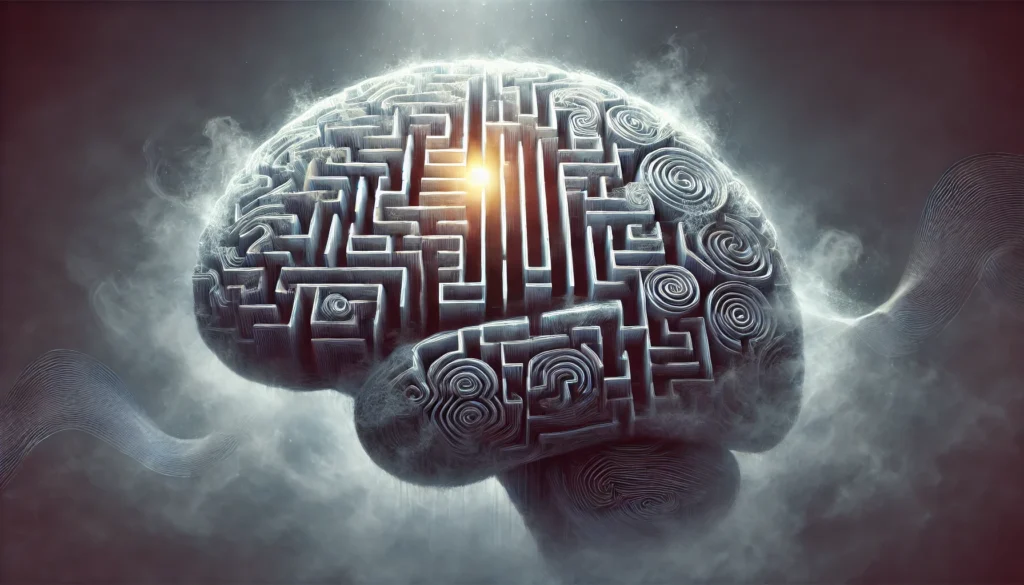Mild Cognitive Impairment, or MCI, is a condition characterized by cognitive changes that are more significant than those expected from normal aging but not severe enough to interfere significantly with daily life or independent function. MCI is a middle ground between normal age-related cognitive decline and more severe dementia.
You may also like: Effective Techniques for Short Term Memory Boost
Defining Cognitive Impairment
Cognitive impairment refers to when a person has trouble remembering, learning new things, concentrating, or making decisions that affect their everyday life. These challenges can manifest in various ways, impacting both personal and professional aspects of an individual’s life. Cognitive impairment ranges from mild to severe. The term “cognitive impairment” encompasses various disorders, including MCI, where the decline is not severe enough to impact daily functioning drastically, and dementia, where the impairment is more pronounced.
Normal Aging vs. Cognitive Impairment
Understanding the distinction between normal cognitive aging and impairment is crucial. While some degree of forgetfulness is normal as people age, cognitive impairment involves more persistent and noticeable deficits. It’s the frequency and impact of these cognitive challenges that set MCI apart from typical aging processes.
Early Detection and its Importance
Early detection of cognitive impairment can significantly influence outcomes. Identifying changes early allows for timely interventions that may help slow progression. Awareness of early signs can empower individuals and caregivers to seek professional advice sooner.
Cognitive Domains Affected
Cognitive impairment can affect various domains, including memory, language, attention, and executive function. The specific domains impacted can vary greatly among individuals with MCI, influencing how the condition presents in different people.
MCI Diagnostic Criteria
The diagnosis of MCI revolves around specific criteria, including evidence of cognitive decline reported by the individual or an informant, preferably corroborated by cognitive tests. However, these changes don’t interfere significantly with daily life, distinguishing MCI from dementia.
Role of Cognitive Testing
Cognitive tests play a pivotal role in diagnosing MCI. These assessments help quantify the degree of cognitive change and provide a baseline for monitoring over time. They are essential tools for healthcare providers to differentiate between MCI and other conditions.
Informant Reports and Self-assessment
Informant reports, typically from family members or close friends, are invaluable in diagnosing MCI. They offer insights into changes that the individual might not recognize or may underreport. Self-assessment, while beneficial, often needs to be supplemented by objective data.
Challenges in Diagnosis
Diagnosing MCI can be challenging due to its subtle nature. Cognitive changes may fluctuate, and symptoms can overlap with other conditions, such as depression or anxiety. This complexity necessitates a thorough and multi-faceted diagnostic approach.

Symptoms and Types of MCI
There are two primary types of MCI: Amnestic MCI, which primarily affects memory, and Non-Amnestic MCI, which affects other cognitive skills like language, attention, or visuospatial skills.
Cognitive Impairment Symptoms
The symptoms of MCI can vary but often include:
- Forgetfulness of recent events or conversations
- Difficulty performing more than one task at a time
- Difficulty solving problems or making decisions
- Taking longer to perform more difficult mental activities
Identifying these symptoms early is crucial, as they might progress to more severe cognitive disorders.
Memory and Recall Issues
Memory problems, particularly with recent events or new information, are hallmark symptoms of MCI. Individuals may find themselves frequently asking the same questions or misplacing items. These lapses can be distressing and impact daily life.
Attention and Multitasking
People with MCI often struggle with maintaining attention and managing multiple tasks simultaneously. This difficulty can affect work performance and daily activities, leading to frustration and reduced efficiency.
Decision-making and Problem-solving
MCI can impair decision-making abilities and problem-solving skills. Individuals may experience challenges in planning or organizing tasks, and complex decisions may take longer to process, impacting personal and professional decisions.
Processing Speed and Mental Activities
A noticeable slowdown in processing speed can be a symptom of MCI. Tasks that require mental effort may take longer, and individuals may find it challenging to keep up with conversations or activities that demand quick thinking.
Can Mild Cognitive Impairment Be Reversed?
One of the most pressing questions surrounding MCI is whether it can be reversed. The short answer is: it depends. Some individuals with MCI return to normal cognition, while others remain stable and some progress to dementia. The trajectory can be influenced by various factors, including the underlying cause of MCI, lifestyle factors, and interventions.
Treatment and Intervention
Currently, there is no FDA-approved medication specifically for MCI. However, certain lifestyle changes and interventions can help manage symptoms and possibly slow progression. These include:
- Cognitive Training: Engaging in activities that challenge the brain can help maintain cognitive functions.
- Physical Exercise: Regular physical activity is linked to better cognitive health.
- Dietary Interventions: Diets like the Mediterranean diet, rich in fruits, vegetables, and healthy fats, have been associated with better cognitive outcomes.
- Social Engagement: Staying socially active can help maintain mental health and cognitive function.
Cognitive Training Techniques
Cognitive training involves structured activities designed to improve specific cognitive functions. Techniques can include memory exercises, problem-solving tasks, and computer-based programs. These activities aim to enhance mental agility and resilience.
Benefits of Physical Exercise
Exercise is a powerful tool in maintaining cognitive health. Regular physical activity promotes blood flow to the brain, supports neurogenesis, and helps reduce risk factors associated with cognitive decline. Activities like walking, swimming, and yoga are particularly beneficial.
Nutritional Considerations
Diet plays a crucial role in cognitive health. Nutritional interventions such as the Mediterranean diet emphasize whole foods, omega-3 fatty acids, and antioxidants, which support brain health. These dietary patterns can potentially slow cognitive decline.
Importance of Social Connections
Social interactions stimulate cognitive processes and emotional well-being. Staying engaged with family, friends, and community can provide cognitive stimulation, reduce stress, and promote a sense of purpose, all of which are beneficial for brain health.
Medication for Mild Cognitive Impairment
While no specific medications are approved for MCI, medications used for Alzheimer’s disease, such as cholinesterase inhibitors, are sometimes prescribed off-label to address symptoms. It’s essential to discuss potential benefits and risks with a healthcare provider.
Off-label Medication Use
Some healthcare providers prescribe Alzheimer’s medications off-label for MCI. These drugs aim to improve neurotransmitter function in the brain, potentially offering symptomatic relief. However, their efficacy in MCI remains a topic of research and debate.
Risks and Considerations
When considering off-label medications, it’s important to weigh potential benefits against risks. Side effects, drug interactions, and individual health conditions must be carefully evaluated. Ongoing consultation with a healthcare provider is crucial for safe management.
Future of Pharmacological Interventions
Research is ongoing to develop medications specifically targeting MCI. Future interventions may focus on neuroprotection, inflammation reduction, and synaptic health. Advances in pharmacology hold promise for more effective management of MCI.

MCI and Dementia: Understanding the Connection
MCI is often seen as a transitional stage between normal cognitive aging and dementia. However, it’s crucial to note that not everyone with MCI will develop dementia.
Mild Cognitive Impairment vs. Dementia
The critical difference between MCI and dementia lies in the severity of cognitive decline and its impact on daily life. Dementia is marked by significant interference with daily activities and independence, whereas MCI does not have such a profound effect.
Progression and Predictors
Understanding the progression from MCI to dementia is a key research focus. Factors influencing this transition include age, genetic predispositions, and the presence of certain biomarkers. Identifying predictors can aid in early intervention and monitoring.
Impact on Daily Life
While MCI may cause noticeable cognitive changes, it typically does not severely disrupt daily living. In contrast, dementia significantly impairs independence, requiring support for basic activities. This distinction is crucial for diagnosis and management.
Emotional and Psychological Effects
MCI and dementia both impact emotional and psychological well-being. While MCI may lead to frustration and anxiety about memory lapses, dementia often causes more profound emotional changes. Supportive interventions are essential for managing these effects.
Cognitive Impairment: Future Directions and Research
The study of MCI is an evolving field, with ongoing research aiming to unravel the intricacies of cognitive decline and find effective interventions.
Current Trends and Future Implications
Researchers are exploring various avenues, including the role of genetics, biomarkers, and novel therapeutic approaches, to better understand and manage MCI. The integration of technology, such as digital cognitive assessments and AI-driven personalized interventions, holds promise for the future of cognitive health management.
Genetic and Biomarker Research
Genetic research is uncovering genes associated with MCI risk, while biomarker studies are identifying substances in the body that indicate cognitive health. These discoveries could lead to predictive tools and targeted therapies.
Technological Innovations
Technology is revolutionizing cognitive health management. Digital tools for cognitive assessment and AI-driven interventions offer personalized, scalable solutions. These innovations enhance early detection and tailor interventions to individual needs.
Collaborative Research Efforts
Collaboration among researchers, clinicians, and technology developers is crucial for advancing MCI understanding and treatment. Sharing data and insights accelerates progress and enables comprehensive approaches to cognitive health challenges.
Conclusion
Understanding Mild Cognitive Impairment is crucial for anyone invested in cognitive health, whether as a health professional, science journalist, or biohacker. While MCI presents challenges, it also offers opportunities for early intervention and management, potentially altering the trajectory toward more severe cognitive disorders. By staying informed and adopting proactive measures, we can better navigate the complexities of cognitive health and work towards maintaining optimal brain function throughout life.
Empowering Individuals and Communities
Empowering individuals with knowledge about MCI enables proactive management and lifestyle adjustments. Communities can benefit from awareness programs that promote brain health and support those affected by cognitive changes.
The Role of Health Professionals
Health professionals play a pivotal role in MCI management. Through early detection, patient education, and personalized care plans, they can help individuals navigate cognitive challenges and maintain quality of life.

A Call for Ongoing Research
Continued research into MCI is essential for developing effective interventions and understanding its complexities. Advancements in this field hold the potential to transform cognitive health care and improve outcomes for millions worldwide.
Further Reading:
Mild Cognitive Impairment: It’s Not ‘Normal’ Aging
Mild cognitive impairment and its management in older people
Important Note: The information contained in this article is for general informational purposes only, and should not be construed as health or medical advice, nor is it intended to diagnose, prevent, treat, or cure any disease or health condition. Before embarking on any diet, fitness regimen, or program of nutritional supplementation, it is advisable to consult your healthcare professional in order to determine its safety and probable efficacy in terms of your individual state of health.
Regarding Nutritional Supplements Or Other Non-Prescription Health Products: If any nutritional supplements or other non-prescription health products are mentioned in the foregoing article, any claims or statements made about them have not been evaluated by the U.S. Food and Drug Administration, and such nutritional supplements or other health products are not intended to diagnose, treat, cure, or prevent any disease.


